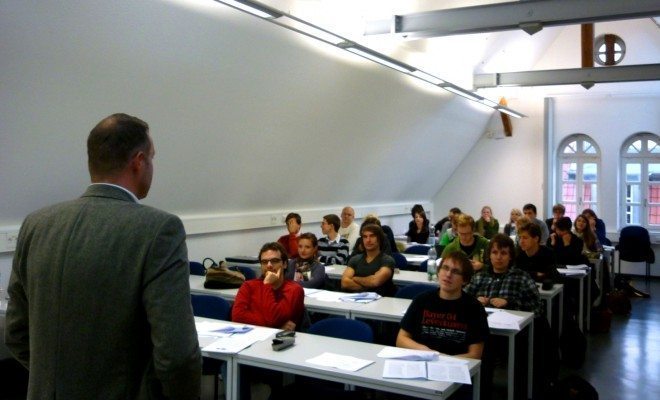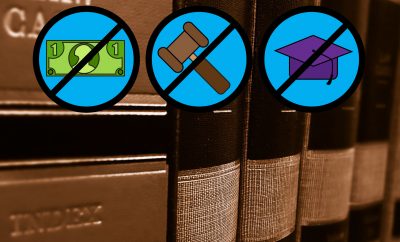
Education
Law School Classes and Their Discontents
Leave it to an actual lawyer to give decent advice to young people thinking of applying to law school. On the U.S. News & World Report website, Shawn P. O’Connor, a Harvard-trained attorney and the founder and CEO of a test-prep and admissions counseling company, has penned a bang-up article about how prospective law students should decide not just whether, but when to apply. When I stumbled upon this article through a link over at Above the Law, I almost cheered out loud when I read the four main questions that Mr. O’Connor says would-be applicants should ask themselves before taking the plunge: 1. Will time off between college and law school hurt my odds of getting in? 2. Am I ready for law school classes? 3. Should I take my parents’ advice? And, 4. When should I take the LSAT? Having gone through the whole brutal, three-year slog myself, I was especially gratified to see people in the know encouraging college kids to consider questions two and three in particular.
Of the four questions, the final one is of the least interest to me, but I’ll happily defer to Mr. O’Connor’s advice — that it’s a good idea to take the LSAT while still in college — which rings true enough. If you’ve followed my commentary here at Law Street Media at all so far, you already know my answers to the first and third questions. So let me turn my attention to the question that I found most important, and that I think has gotten nowhere near enough attention in the recent discourse about the wisdom of law school: the nature of law school classes. Think of my existing advice as the “Alleyne doctrine” — people should learn as much as they can about lawyers’ work before applying to law school — and of the following as the corollary: People should learn as much as possible about the law school curriculum before applying.
A recent article at Salon.com has put American law schools on blast for adopting a “hyper-capitalist” approach both to the law itself and to teaching it. I don’t buy the piece’s central thesis, if only because of my own law school experiences (but that’s a story for a later article). Author Benjamin Winterhalter did, however, have me nodding through most of an early paragraph that describes the Socratic method of lecturing as “a mode of instruction whose sole discernible purpose is to torture students through the elaborate belaboring of obvious points” and that bemoans “the end-of-semester exam, a three-hour rite of passage that is graded anonymously, covers an entire semester’s worth of material, and counts for 100% of one’s grade.” These are two critical aspects of law school classes that distinguish legal pedagogy from most other forms of higher education, and for which many law students (most definitely including yours truly) are insufficiently prepared.
Actually, I’m not sure where or when Winterhalter attended law school, or what else possessed him to write about “three-hour” final exams. The briefest exam I ever took in law school — my 1L Torts final — lasted three and a half hours, and it was obvious that the professor only cut it that short to make it artificially harder, thus making it easier for him to grade it on a curve. (Bastard.) Otherwise, in 3 years of law school, every in-class exam lasted either four or five hours. I remember my Property professor saying that he used to give his students six-hour exams until the Registrar made him stop. Three hour exams seemed long and torturous to me in college, all right, but law school certainly disabused me of that delusion.
Then again, as much as I dreaded each four-or-five-hour ordeal beforehand, once in the classroom I found myself wishing the exams were actually longer. Many law school exams, you see, are based on lengthy, implausibly convoluted “fact patterns” — which is weird legalese for “hypothetical” — full of countless juicy legal issues just waiting for you to spot them and sink your teeth into them. Skilled professors, however, are adept at hiding these issues in fact patterns in ways that make it hard to spot them, to do them analytical justice within several hours and to avoid second-guessing one’s own analysis of them. (This is especially difficult for naturally ungifted test takers like me.) Combine these factors with the incredible dryness of most of the subject matter involved and the fact that each single exam will probably count for the entirety of the respective course, and you’ve got quite a challenge on your hands.
I’ve always strongly doubted the wisdom of this approach to teaching law. The competitiveness of the system isn’t the problem; legal practice is a highly competitive field, and the more law schools prepare their students for the struggle to stay ahead of the curve, the better. Yet I do question the intellectual usefulness of the byzantine hypos to which many of my professors subjected us. The facts in real-world cases, mind you, are often very complex, but in all the legal research I’ve done, I have yet to encounter a case with a factual history that approached the pretzel-like contortions that characterize law school exam fact patterns. Real-life lawyers certainly don’t have to decipher these cases and judge the legal claims within them in a matter of several hours. And at the end of the day, making an entire course grade dependent on one exam is a recipe for inaccurate evaluations of each student’s true lawyering potential. Test-taking aptitude is one thing; lawyering skill is another. The insistence on assessing the latter according to the former may very well contribute to the inadequate preparation of students for legal practice that plagues law schools today.
I don’t have much to say about Socratic dialogue, other than that I greatly appreciated my Criminal Law and Criminal Procedure professor’s practice of not calling on students at random in class. I forget his rationale for that policy, but I agree with Benjamin Winterhalter’s criticism of Socratic dialogue for its “belaboring of obvious points.” While I sympathize with professors’ desire to maximize class participation, Socratic interrogation generally consists of professors asking students for answers that are obvious to the questioners but painfully elusive to the hapless respondents. Undergoing the exercise often feels like being asked to read professors’ minds, a process that encourages students to second-guess themselves even when they actually know the right answers. That sort of professor-student interaction works splendidly in class discussions in which there is room for debate about what the law is or should be. In the context of larger lectures designed to teach basic, indisputable legal doctrines, however, students could probably do without it.
All of this advice may be wasted on the legal academy, of course. God alone knows how likely professors and administrators will ever be to change their ways. For the time being, at least, the law school curriculum as we know it is probably here to stay (with modest variations, of course, from school to school and from professor to professor). As long as the status quo prevails, anyone thinking of becoming a lawyer should first try to learn not only what it’s like to practice law, but also what it’s like to study it. Visit law schools, sit in on lectures, ask current students or graduates for copies of casebooks or old exams — do whatever it takes to make sure that once you walk through those doors, you’re not flying blind.
—
Featured image courtesy of [George Serdechny via Flickr]








Comments